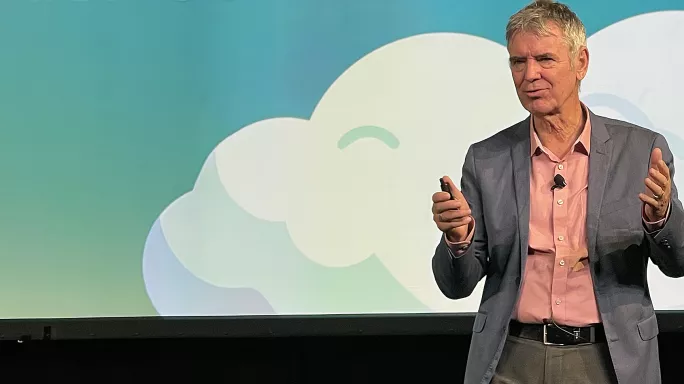
- Home
- Teaching & Learning
- General
- John Hattie: Why teaching strategies don’t make you an expert teacher
John Hattie: Why teaching strategies don’t make you an expert teacher

John Hattie has changed his mind about the importance of teaching strategies.
When his book Visible Learning was published in 2008, it made him one of the biggest names in education research. His synthesis of more than 800 meta-analyses set out to determine what teachers can do to maximise their pupils’ learning, and offered a list of evidence-informed strategies to help them.
But 15 years on, Hattie, an emeritus laureate professor at the University of Melbourne’s Graduate School of Education, is still trying to set the record straight about the message that Visible Learning was trying to convey.
While many have approached his book as a kind of “checklist” of techniques that, when taken together, add up to better teaching and greater school improvement, this was never how he intended the book to be received.
More on John Hattie:
- Hattie: We need to get better at learning transfer
- Ofsted “doesn’t care about learning”, says Hattie
- John Hattie takes on his Visible Learning critics
“The mistake I made in the first version is with the league table of influences,” Hattie admits. “It got interpreted as me saying that you should do the things at the top and shouldn’t do the things at the bottom. And that was never my message.”
Now, with his upcoming book Visible Learning: the Sequel due to be published in March this year, Hattie is keen to move past the focus on teaching strategies and to think more holistically about what makes expert teaching.
Tes sat down with him to find out more.
Tes: How has your view of what makes good teaching shifted since the publication of Visible Learning?
John Hattie: Of all the factors that affect students in schools, it’s teachers who have the greatest impact. That’s what I concluded in Visible Learning, and while I still believe that, I now think we have to change the questions we ask about teaching.
A lot of research focuses on teaching strategies that have a high probability of being effective. We already know what these are, and we are already supporting teachers in delivering them in the classroom.
But we need to stop [just] looking at the strategies teachers are using, and instead look more closely at the impact we have on students and how they learn best.
That’s why, for the past five years, I’ve stopped anyone using the [Visible Learning] league table in the groups I work with, and you won’t find one in the new sequel either. Instead, I’ve tried to switch the whole focus to knowing the impact.
Because, ultimately, you can have a teacher who doesn’t use a lot of feedback, open questions, scaffolding or success criteria, and yet still has success. We need to understand more about that expertise.
How do we begin to do that?
The problem is: we are hopeless at identifying successful teaching and scaling it up; that’s one of the most frustrating things in our business.
So, we need to ask less about how students engage in doing work, and more about how students think, know and solve. We need to shift from focusing on the impact of talking to focusing on the power of listening.
‘We need to switch from saying “I care about how you teach” to saying “I care about the impact of your teaching”’
Here’s the irony: I get criticised for the term “visible learning” because learning is not visible. But that’s actually my point: I want to switch the discussion from teaching to learning, and I want to make it more visible, not just with the kids but also with the teachers.
That means we need to switch the discussion from saying “I care about how you teach” to saying “I care about the impact of your teaching”.
When you do that, suddenly the door opens and you find teachers that have incredible impact.
But identifying those who are successful also means critiquing those who aren’t. We need to get teachers to work together to diagnose, evaluate, think aloud and close these gaps in expertise. When this is a norm, it allows the practice of thinking and evaluating the best to spread like a virus around the school.

Isn’t this something that schools are doing already? Observing colleagues and collaborative planning are common practices, after all.
In my view, the worst thing an expert teacher can do is to invite another teacher to observe them teach, and hand over their resources. That’s very generous, but what matters more is those evaluative decisions that teachers make in the moment. You can’t simply watch a teacher and understand how and why they make those decisions; you have to hear them think, evaluate and adapt.
In Australia, we have come up with a new method of observation. We ask expert teachers to consider a lesson they are planning to deliver, and then to record themselves talking through their planning. Then the lesson is filmed. The expert teacher then records themselves again, explaining the decisions and the evaluative decisions they made in the moment. The two recordings are then layered over the video.
This allows those who watch the videos to hear what the teacher is thinking in real time. When you get teachers thinking aloud and talking about the decisions they’ve made, they are stunningly brilliant at critiquing each other.
I really think that’s where research is turning to: more thinking aloud, more dialogue, more understanding of that. In five to 10 years, we will see a massive breakthrough in the automation of classroom observation, and teaching will improve because of it.
Is that kind of automation something that teachers want, though?
Well, my wife, Janet Clinton, developed an app called Visible Classroom with the Education Endowment Foundation a few years ago. Teachers recorded their entire lesson via an iPhone app, and a transcript was produced immediately, with 99 per cent accuracy, of everything they said. The transcriptions were then coded using artificial intelligence, again in real time, against an evidence-based rubric of effective teaching practices, and feedback was provided to teachers.
‘You can’t simply watch a teacher and understand how and why they make decisions; you have to hear them think, evaluate and adapt’
We stopped a couple of years ago because the technology is now far ahead of where we were. But one of the things we found, from our work in England, was that 89 per cent of classroom time is spent with the teacher talking. Teachers asked around 150 questions a day, most of which required less than three-word answers. That’s the norm. Most teachers don’t know that, and they deny it. But the evidence is undeniable, and when they do see their own results, it drives them to improve.
Automation of classroom observations has the potential to change how teachers think, and get them to see what it looks like through students’ eyes.
Are there any downsides to this kind of approach?
There are downsides as much as upsides. For example, in one US state, we were told we couldn’t use the app because it would produce evidence of incompetence. In another country, the parents heard about it and wanted it to work out how many minutes their child spent with the teacher each day.
And yet I do think there is going to be a fascinating breakthrough in improving the quality of education across the world through different types of observation.
It all comes back to the need to refocus education: it’s not about how we teach but the impact we have on pupils. I’m also conducting the world’s largest student survey about learning to drive this work forward.
Can you tell us more about that?
The survey is being run through Trusts for Impact, a group of academy chains in the UK with more than 50,000 students.
In the trust survey, we looked at nine things: what expectations the pupils have, whether they like challenge, how they deal with distraction, if they are prepared to seek help from their teachers, their perception of teachers’ enthusiasm, whether they see errors of opportunity, if the rules within the class are applied fairly, if they feel like they belong, and if they feel as though they are invited to learn.
We then take this data and feed it back to the school, highlighting where the gaps are. We’ve found enormous differences between the schools. There were some stunning schools, and some schools that needed work.
And how do you hope schools will use that data to improve teaching?
Well, we have tens of thousands of assessments of what’s been learned, but we need to assess how capable the students are at learning. If students haven’t got the skills to learn, teaching can’t be effective.
We’re hoping this survey clarifies those areas in which work is needed. We know that schools are very good at interventions. I’ve never met a principal yet that doesn’t have a toolbox of solutions. However, they’re not so good at diagnosis and then making sure those interventions apply to the diagnosis.
“Many inspection systems measure the slickness of the principal’s presentation but not necessarily the learning”
There are some rules about joining: you can see where you sit in the national picture, but you can’t see the names of the other schools. You can only see your results, and where you rank. This isn’t about naming and shaming, it’s about improving the quality of learning.
And, just as an aside, I took the Ofsted ratings of all the schools where the survey had been completed, and their ratings had zero correlation with the quality of learning skills of pupils in those schools. It shows that many inspection systems measure the slickness of the principal’s presentation but not necessarily the learning and the improvement of the students.

Much of your work has focused on the steps schools can take to improve learning, but are there any common practices that you believe are detrimental to learning?
Labelling. The most invidious, nastiest thing we do is invent ways to label kids.
We know that labelling leads to a negative effect on pupils’ achievement. If you don’t think the kids know why they’re in the “elephant” group, you’re off your nutter.
If I look at my own life, I was born in a small rural town in New Zealand, in the days before television existed, and we didn’t have a car until I was 15. But no one told me that we weren’t affluent; no one told me I couldn’t. My naivety was the main thing that allowed me to prosper during and after schooling.
Today, you’re labelled as soon as you enter the education system. Absurdly, in my state, we have four or five schools you can’t go into unless you’re autistic, as if all autistic kids are the same. It’s madness, and it leads to very low expectations.
That’s the kind of thing that I worry about. We have high-achieving classes in the UK: there are grammar schools and comprehensive schools. I know the intention behind [selection] is noble, but the impact is devastating for so many kids. Why do we think a label is a solution?
What can be done to change this?
We are moving in the right direction: Italy scrapped special schools back in the 1970s. And in New Zealand, two teachers’ federations have just come out wanting to ban ability grouping.
So, it is possible. In the University of Melbourne, about six or seven years ago, we actually abolished special education. It didn’t go down well, and some people left in anger. We then reinvented it as learning interventions; we said that every student needs a learning intervention, regardless of their label.
Beyond ending the practice of labelling, what other changes would you like to see in education?
I want to go back to that fundamental finding that the biggest influence in schools is teacher expertise.
Yet in the UK and in Australia, we don’t have a career path for excellence in teaching. The more excellent you are as a teacher, the more you are pushed into leadership.
We do need good leaders, too, but we cannot have a system without a career structure for classroom teachers. The big problem is: the profession doesn’t see expertise as part of its assets. We need to change that.
‘The most invidious, nastiest thing we do is invent ways to label kids’
I’m hoping my work, and the Visible Learning sequel, will support the sector to do this.
Your first book attracted some criticism. Did you consider this when writing the sequel?
I live in the world of academia, and we survive by critique; it’s the essence of our business. I have the luxury of having the world’s best critics, and I’ve learned a lot from them.
Sometimes I shake my head and wonder where they’re coming from. A lot of them criticise meta-analysis as a method. Some of them criticise me and my interpretations. In fact, a couple of years ago a colleague and I tried to find every criticism we could find of Visible Learning - there’s about 100 of them - and we wrote a paper reacting to them.
Around 80 per cent of the critiques are about the league table of teaching strategies I included, and even though it led people to the work, in some ways they were right to criticise that. Other critics, however, have never even read the book, have misinterpreted the work or just got it plain wrong. And yet they still get cited by others.
I’ve tried not to react to those people because I think criticism is the nature of this kind of work. And, as you’ll see in the sequel, I’ve listened to some of them.
John Hattie will be one of the speakers at this year’s World Education Summit. Tes is official media partner for the event. For more information and to book your place visit worldedsummit.com
You need a Tes subscription to read this article
Subscribe now to read this article and get other subscriber-only content:
- Unlimited access to all Tes magazine content
- Exclusive subscriber-only stories
- Award-winning email newsletters
- Unlimited access to all Tes magazine content
- Exclusive subscriber-only stories
- Award-winning email newsletters
You need a subscription to read this article
Subscribe now to read this article and get other subscriber-only content, including:
- Unlimited access to all Tes magazine content
- Exclusive subscriber-only stories
- Award-winning email newsletters
- Unlimited access to all Tes magazine content
- Exclusive subscriber-only stories
- Award-winning email newsletters
topics in this article



